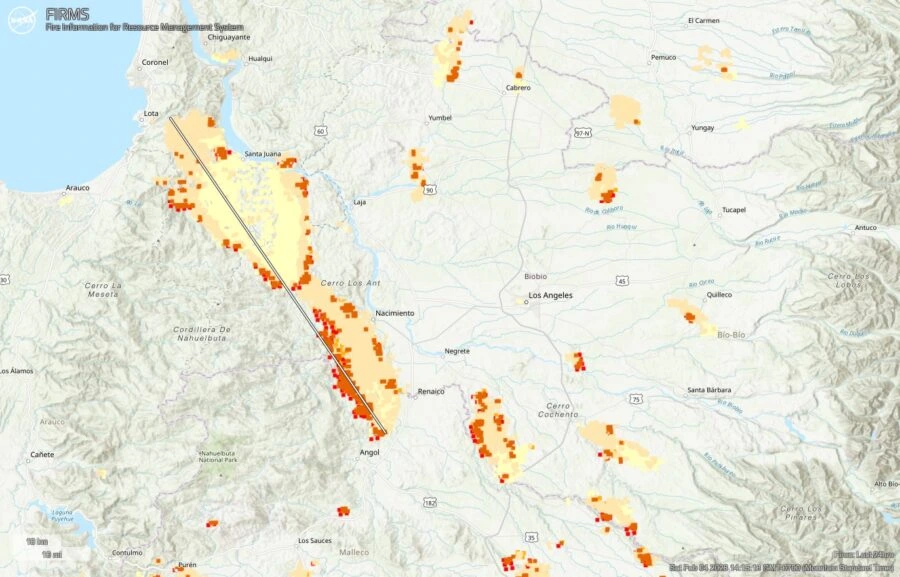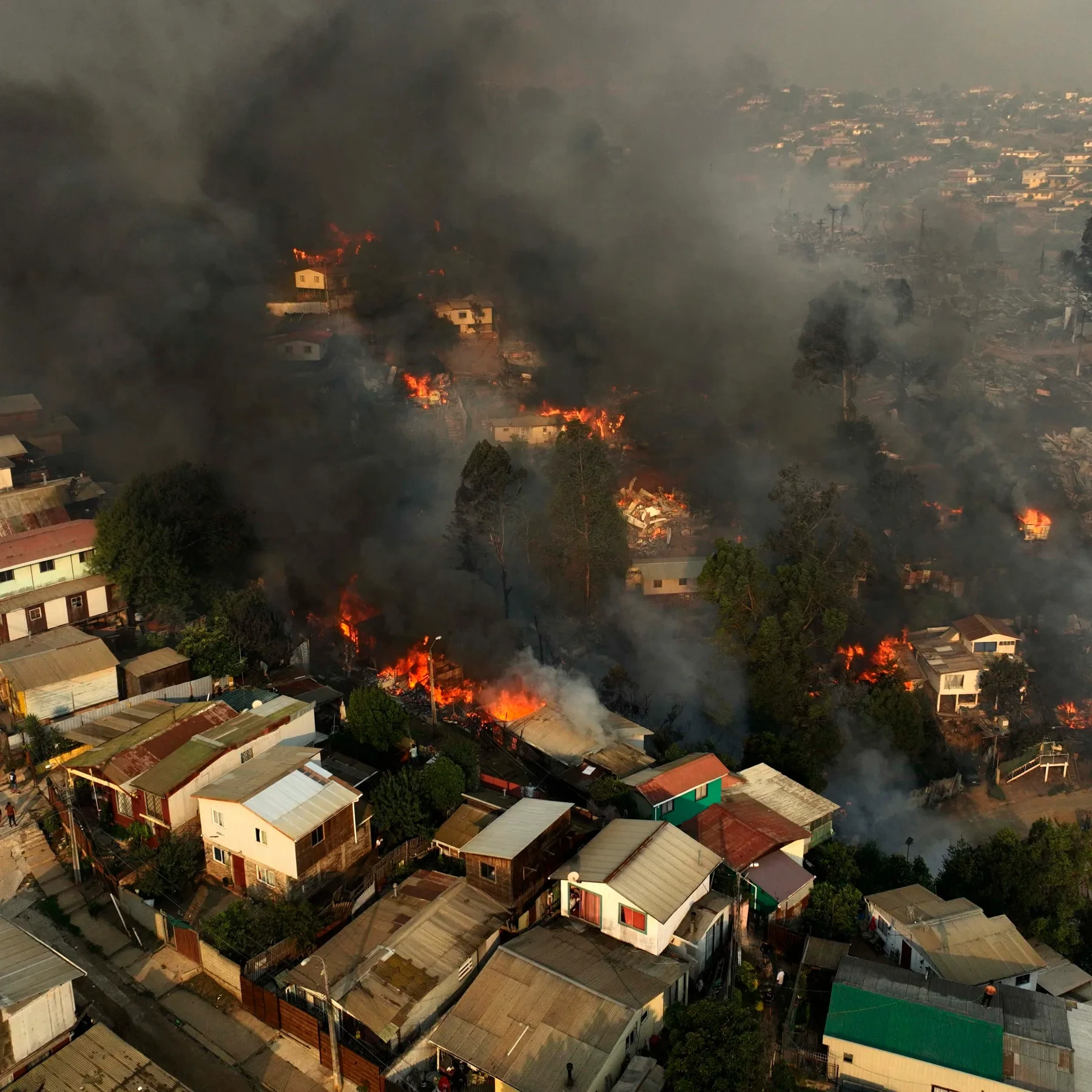Contents
- 1 Overview of the scale and impact of the wildfires in chile
- 2 Government response to the wildfires in chile
- 3 Causes of the wildfires in chile
- 4 Environmental consequences of the wildfires
- 5 Efforts to control and extinguish the wildfires
- 6 Humanitarian aid and support for affected communities
- 7 Lessons learned from previous wildfires in Chile
- 8 Prevention and preparedness measures for future wildfires in Chile
- 9 Call to action
- 10 Author
Wildfires in Chile: At least 46 people have lost their lives as a result of the devastating wildfires currently wreaking havoc across Chile. The government has declared a state of emergency as firefighters battle to contain the rapidly spreading infernos that have ravaged nearly 200,000 acres of land so far. The situation is dire, as strong winds and high temperatures continue to fuel the flames, making it incredibly challenging for authorities to gain control.
The wildfires, which originated in the central region of Maule, have since spread to the tourist hotspots of Valparaiso and O’Higgins. Homes have been destroyed, communities have been evacuated, and wildlife has been decimated. The scope of this catastrophe is overwhelming, and the impact on both the environment and human life is devastating.

Overview of the scale and impact of the wildfires in chile
The scale of the wildfires in Chile is staggering. With nearly 200,000 acres of land already destroyed, the fires have left a trail of destruction in their wake. Entire communities have been displaced, and the loss of life is heart-wrenching. The impact on the environment is equally significant, with countless trees, plants, and wildlife species falling victim to the flames.
These wildfires are not an isolated incident. Chile has a long history of destructive wildfires, but the current situation is one of the worst the country has experienced in recent years. The combination of strong winds, high temperatures, and dry conditions has created the perfect storm for these infernos to spread rapidly and uncontrollably.
Government response to the wildfires in chile
In light of the severity of the wildfires, the Chilean government has declared a state of emergency. This declaration grants authorities additional resources and powers to combat the fires and provide support to affected communities. The government has mobilized national and international resources, including firefighters, aircraft, and equipment, to tackle the flames from both the ground and the air.
Efforts to contain the togel online resmi wildfires in chile and protect human life are a top priority. Evacuation orders have been issued for at-risk areas, and emergency shelters have been set up to provide temporary housing and support for those affected. The government is working closely with local authorities, NGOs, and international organizations to coordinate rescue and relief operations.
Causes of the wildfires in chile
The exact causes of the wildfires in Chile are still under investigation. However, it is believed that a combination of natural and human factors have contributed to the spread and intensity of the fires. The dry and windy conditions, coupled with high temperatures, create a favorable environment for fire ignition and rapid fire spread.
Human activities such as land clearing, illegal burning, and negligence can also play a significant role in sparking wildfires. In some cases, campfires or discarded cigarettes can lead to devastating consequences. Climate change has further exacerbated the conditions, making wildfires more frequent and intense.
Environmental consequences of the wildfires
The environmental consequences of the wildfires in Chile are far-reaching. The destruction of vast areas of forest and vegetation not only leads to the loss of habitat for countless plant and animal species but also disrupts the delicate balance of ecosystems. The long-term impact on biodiversity and ecosystem services is a cause for concern.
Moreover, the smoke and ash produced by the wildfires contribute to air pollution, posing a threat to human health. The release of carbon dioxide and other greenhouse gases from burning vegetation adds to the already pressing issue of climate change. The recovery of the affected areas will be a complex and time-consuming process, requiring concerted efforts to restore the natural environment.
Efforts to control and extinguish the wildfires
Combating the wildfires in Chile is an uphill battle. The combination of strong winds, high temperatures, and difficult terrain makes it challenging for firefighters to gain control over the flames. Firefighters are working tirelessly, risking their lives to protect communities and contain the infernos.
National and international resources have been mobilized to support the firefighting efforts. Firefighting aircraft, helicopters, and ground crews are deployed to strategic locations to combat the fires from multiple angles. Firebreaks, which are areas cleared of vegetation to prevent the spread of fire, are being created to contain the wildfires.
Humanitarian aid and support for affected communities
The impact of the wildfires on affected communities cannot be overstated. Many families have lost their homes and livelihoods, and the emotional toll is immense. In response, humanitarian aid and support are being provided to those affected. Emergency shelters have been set up to provide temporary housing and basic necessities.
NGOs and international organizations are working alongside the government to deliver aid and support to affected communities. Donations from individuals and businesses are crucial in ensuring that those affected receive the assistance they need to rebuild their lives. The road to recovery will be long, but with collective support, affected communities can overcome this tragedy.
Lessons learned from previous wildfires in Chile
Chile has faced devastating wildfires in the past, and each event serves as a learning opportunity. The lessons learned from previous wildfires have contributed to improved preparedness and response strategies. It is essential to analyze the causes, response times, and effectiveness of measures taken during past wildfires to identify areas for improvement.
Investments in fire prevention and preparedness measures, such as early warning systems, fire-resistant infrastructure, and public awareness campaigns, are crucial in mitigating the impact of future wildfires. Collaborative efforts between government agencies, local communities, and experts are necessary to develop comprehensive strategies that address the root causes of wildfires.

Prevention and preparedness measures for future wildfires in Chile
Preventing wildfires and minimizing their impact requires a multi-faceted approach. Education and public awareness campaigns play a vital role in promoting responsible behavior and preventing accidental fires. Strict enforcement of regulations against illegal burning and land clearing is necessary to curb human-caused wildfires.
Investing in fire-resistant infrastructure, such as firebreaks and fire-resistant building materials, can help protect communities at risk. Early warning systems and advanced fire detection technology enable swift response and evacuation when necessary. Close collaboration between government agencies, firefighting organizations, and local communities is essential in developing and implementing effective prevention and preparedness measures.
Call to action
The devastating wildfires in Chile serve as a stark reminder of the destructive power of nature and the urgent need for action. As the flames continue to ravage the land and claim lives, it is imperative for individuals, communities, and governments to come together to address the root causes of wildfires and implement effective prevention and preparedness measures.
By supporting organizations involved in firefighting efforts and providing aid to affected communities, we can make a difference in the lives of those impacted by these tragic events. Additionally, promoting sustainable practices, responsible land management, and raising awareness about the consequences of our actions on the environment can help prevent future wildfires.
If you’ve been moved by the events discussed in this article and are keen on exploring the narratives of individuals shaping our world, please consider reading our article on Elon Musk. There you will find a fascinating exploration of how one visionary’s drive for innovation is addressing global challenges and inspiring leadership in technology and beyond.





